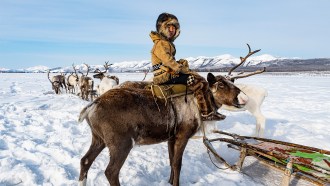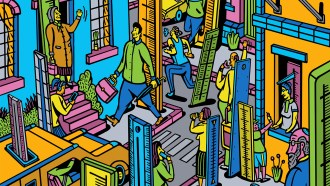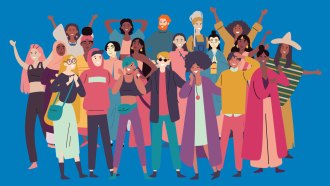
Sujata Gupta is the social sciences writer for Science News. She was a 2017-18 Knight Science Journalism fellow at MIT. Her work has appeared in The New Yorker, Nature, Discover, NPR, Scientific American, and others. Sujata got her start in journalism at a daily newspaper in Central New York, where she covered education and small town politics. She has also worked as a National Park Ranger, completing stints at parks in Hawaii, California and Maine, and taught English in Nagano, Japan.

Trustworthy journalism comes at a price.
Scientists and journalists share a core belief in questioning, observing and verifying to reach the truth. Science News reports on crucial research and discovery across science disciplines. We need your financial support to make it happen – every contribution makes a difference.
All Stories by Sujata Gupta
-
 Psychology
PsychologyNavigation research often excludes the environment. That’s starting to change
Participants “navigating” on a lab computer have shaped navigation knowledge. Studies that add in the environment challenge those findings.
-
 Science & Society
Science & SocietyThere’s a new term for attempting to own the wind: ventography
Nations established territorial claims underground to access oil and gas. Now they are expanding those claims upward to snag the wind.
-
 Science & Society
Science & SocietyThis researcher studies how misinformation seeps into science and politics
The world is awash in information. Communications researcher Yotam Ophir digs into news articles and survey results to show how beliefs form and spread.
-
 Artificial Intelligence
Artificial IntelligenceTalking to a chatbot may weaken someone’s belief in conspiracy theories
AI might help lift conspiracy theorists out of the rabbit hole, but some researchers say proceed with caution.
-
 Artificial Intelligence
Artificial IntelligenceAI generates harsher punishments for people who use Black dialect
ChatGPT and similar AI sort those who use African American English dialect into less prestigious jobs and dole out harsher criminal punishments.
-
 Humans
HumansDoes social status shape height?
A controversial idea drawing on findings from the animal kingdom suggests there’s more to human stature than genetics and nutrition.
-
 Psychology
PsychologyOnline spaces may intensify teens’ uncertainty in social interactions
Little is known of how teens learn about emotions online and then use that knowledge to cope with social uncertainty during in-person encounters.
-
 Science & Society
Science & SocietyLanguage models may miss signs of depression in Black people’s Facebook posts
Researchers hope to use social media posts to identify population-wide spikes in depression. That approach could miss Black people, a study shows.
-
 Science & Society
Science & SocietyNot all cultures value happiness over other aspects of well-being
Nordic countries topped the 2024 world happiness rankings. But culture dictates how people respond to surveys of happiness, a researcher argues.
-
 Science & Society
Science & SocietySocial media harms teens’ mental health, mounting evidence shows. What now?
Recent studies suggest a causal link between teen social media use and reduced well-being. Now, some researchers are looking into possible mechanisms.
-
 Science & Society
Science & SocietyMost people say self-control is the same as willpower. Researchers disagree
Psychologists say self-control is about planning ahead to avoid relying on willpower in the moment. Laypeople see things differently.
-
 Psychology
PsychologyHere’s how to give a good gift, according to science
Gifting researcher Julian Givi outlines common mistakes gift givers make and how science can help us avoid those costly errors.